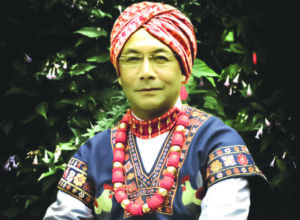By Our Special Correspondent
Shillong, Feb 20: One of the few Khasi scholars who was deeply involved with village communities and tried to empower them through awareness of their rights, Prof AK Nongkynrih, the former Head of Sociology Department, NEHU passed away on Saturday morning, at Bethany Hospital Shillong. Nongkynrih had been ailing for some time now but was known to live a regimented life. He never missed his morning walks and was meticulous about his diet and his health, his family members and others close to him informed.
The mortal remains of Prof Nongkynrih were brought to his 100-year old ancestral home in Shnongpdeng Sohra on Saturday. Since then people from all walks of life, including his students and colleagues from NEHU and elsewhere have been thronging his residence to pay their last respects. Students who saw his still, lifeless body had tears. They could not believe their once vibrant mentor and patient coach is no more.
Nongkynrih’s elder sister says, every Christmas he would be in Sohra and liven up the entire neighbourhood. He maintained the house, did constant repairing and painting.
His past students speak of how they made a pilgrimage to that home whenever they went for field work to Sohra.

Nongkynrih was part of several national and international bodies where he contributed his brilliant ideas for the special interventions needed to uplift the indigenous communities of Meghalaya and North East India.
As the founding member and Vice Chairperson, North East Slow Food and Agrobiodiversity Society (NESFAS), Prof Nongkynrih played a major role in advocating the vision and mission of the Organisation. He was instrumental in initiating several studies on key issues.
A man of great intellect and vision, Nongkynrih contributed immensely to the cause of preserving traditional knowledge, the indigenous food systems and advocating the role of women’s participation in decision-making.
His book Khasi Society of Meghalaya: A Sociological Understanding, is a primer on the Khasi matrilineal society, its practice and lived experiences. He has written several articles for peer-reviewed journals too. Nongkynrih was the first to study the business model of the Mookaiaw Co-operative Society that ran several Tata Sumos and passenger buses between Jaintia Hills and Shillong.
Phrang Roy, former Vice Chairperson, International Fund for Agricultural Development (IFAD) and presently the Chairperson, NESFAS and a close associate of Nongkynrih says, “His passing away is a loss to our communities and an irreparable loss to our Organization as he was its strong pillar.
Few scholars are grounded to the society they live in but Prof Nongkynrih constantly engaged with the rural communities especially with the people of Khatar Shnong. He was of the firm belief that traditional farming is one of the many ways that the indigenous tribes can preserve their traditional knowledge in this region. One of his aims was to defend the local food systems in the state.
Nongkynrih, played an active role during the Indigenous Terra Madre hosted by NESFAS in 2015 in Mawphlang, East Khasi Hills as a speaker and a panelist. He was also a founding member of the Indigenous People Assistance Facility Grant Committee 2006, UN-IFAD.
In their tribute to Prof Nongkynrih the NESFAS team said, “Today we mourn the passing of a great man, a son who has left behind a powerful legacy of humility, simplicity, and dedication to all the things that he greatly believed in. We at NESFAS, will forever be grateful that we have had the opportunity to work closely with such a legend and will uphold his words of wisdom at all times.”
Prof Nongkynrih leaves a void in the academic world that is not easily filled. As a member of the IFAD, he provided critical inputs to the international organisation in understanding the indigenous communities of North East India. He was also the Ethics Committee Member of NEIGRIHMS.
Prof Nongkynrih’s mortal remains will be laid to rest at the Catholic graveyard at Sohra on Tuesday.



